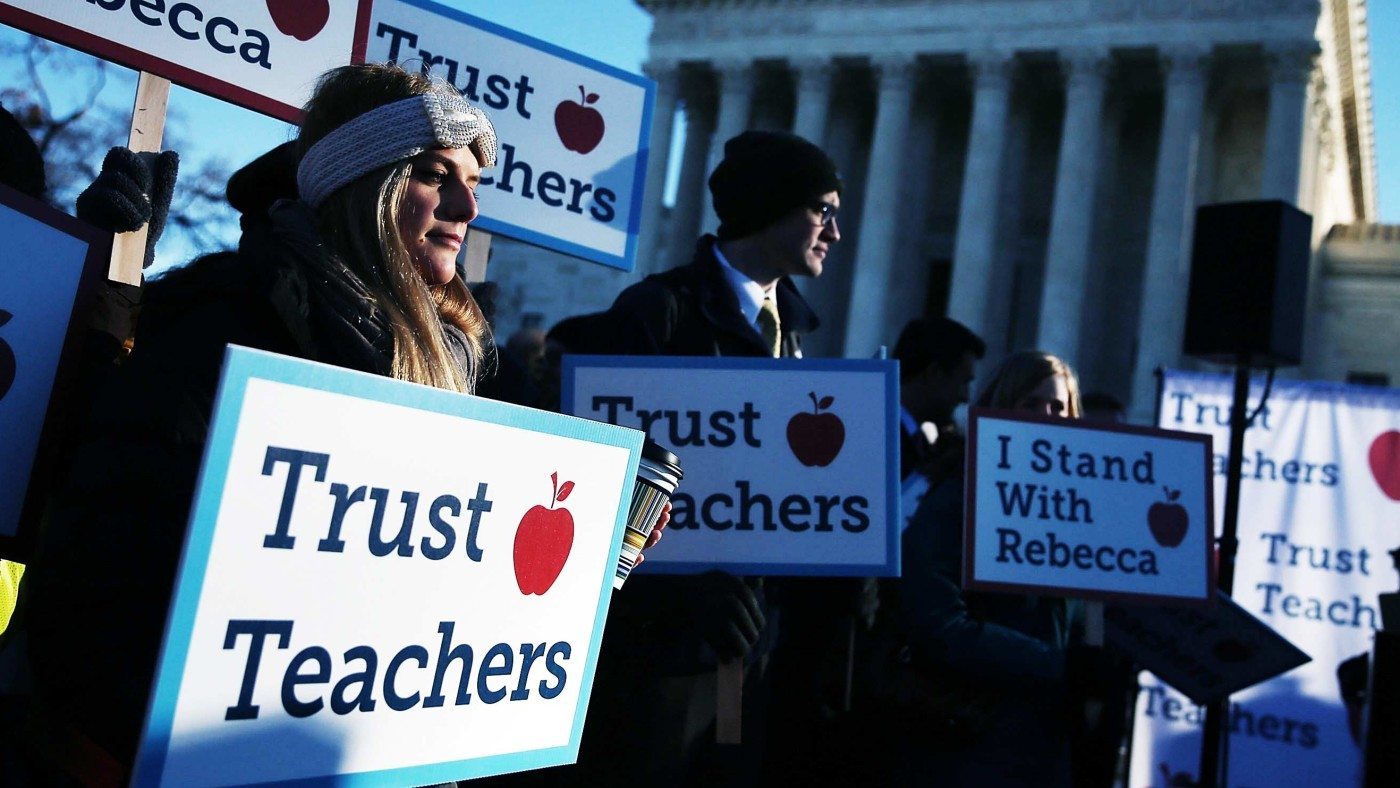In the Washington Post, Steven Greenhouse offers a novel reason for why the Supreme Court should require teachers to pay union dues: to avoid punishing unions. He explains that “public-sector unions are among the biggest donors to labor-friendly Democratic candidates, and their lobbyists use their influence to go to bat for workers on issues such as increasing the minimum wage and enacting sick-day and family-leave laws.”
Supreme Court decisions are rarely based on the ends—loss of union power—justifying the means—abridgment of free speech, however. The Court cannot justify a legal outcome based on political preferences for the politics of labor unions.
Greenhouse estimates that a win for Rebecca Friedrichs in Friedrichs v. California Teachers Association, a case heard by the Supreme Court on January 11, could cost public sector unions $500 to $1 billion annually. The use of that political influence is precisely why Friedrichs wants to opt out of the union. She believes that compulsory union membership violates principles of free speech and association. The case will be decided by June, 2016.
Greenhouse implicitly wants the Supreme Court to require that teachers pay $600 to $1,000 out of their paychecks annually so that unions can continue to wield political power. He quotes Viveca Novak of the Center for Responsive Politics, “If this ruling goes against labor, it potentially means a lot less money available to unions to spend on things like politics. Labor is a big part of Democratic fundraising.” That’s the point: Friedrichs and other teachers do not want their money spent on politics.
If the Supreme Court rules for Friedrichs, Greenhouse explains that “teachers unions might be forced to devote fewer resources to keeping state legislatures from banning tenure or ‘last in, first out’ layoff protections.” But these measures keep poor teachers in place and reduce the quality of teaching for children.
Union rules make it difficult to get rid of teachers who are not doing a good job. In New York City and Chicago, barely 1 in 1,000 teachers is fired for poor performance. In Los Angeles, fewer than 2 percent of teachers are denied tenure—and only 0.25 percent of teachers who received tenure were fired over the course of a decade. Union contracts generally rule out merit bonuses, so good teachers are not rewarded.
The California Teachers Association holds that since Friedrichs and other plaintiffs get the benefits of their negotiations with taxpayers, they should not be allowed to stop paying union dues, or they would be “free-riders” on union members. But teachers are not free-riders, but captive passengers. Unlike federal government workers, they have no choice but to pay dues.
A win for Friedrichs would give state government workers the same privileges as federal employees, who are not forced to join unions such as the National Treasury Employees Union or the American Federation of Government Employees. The Supreme Court should extend the same protections to state workers.
Greenhouse cites Princeton professor Henry Farber as saying that weaker public sector unions would mean that states would be under less pressure to fund their state pension plans. But with existing state public sector unions, states are now $5 trillion in debt from unfunded pension liabilities. Illinois has about $100 billion of unfunded liabilities, according to the Commission on Government Forecasting and Accountability.
To cover the total unfunded pension liabilities of state governments, each person in the United States would have to pay $15,052. This is because public sector unions prefer to negotiate higher paychecks on behalf of their workers and leave the pensions underfunded. They believe, no doubt correctly, that taxpayers will pick up the bill for the underfunded state pensions. State workers are paying into pensions that are unsustainable and whose benefits at some point will have to be revised downwards.
Greenhouse states that low-income workers are beneficiaries of union lobbying, but the poor do not always benefit from unions’ advocacy of paid sick leave and higher minimum wages. Washington, D.C., will have a $15 minimum wage on the ballot in November and is considering requiring employers to offer 16 weeks of paid family leave. These measures reduce the feasibility of large retail operations which provide employment opportunities, including entry-level positions to low-skill workers.
In response to proposed legislation advocated by unions, Walmart announced that it was cancelling plans for two stores in low-income areas of Washington. The losers are residents near Skyland Town Center in Southeast and Capitol Gateway Marketplace in Northeast who would have been employed at these stores.
The issue before the court is not whether the California Teachers Association reflects Greenhouse’s views; the issue is whether the union reflects the views of its 325,000 members. For some members, the answer is obviously no.


